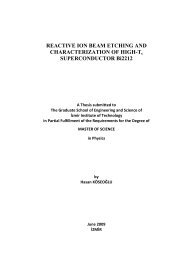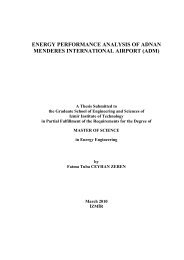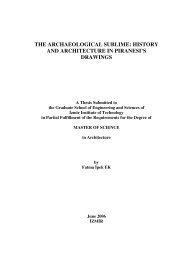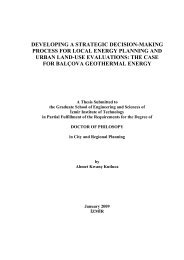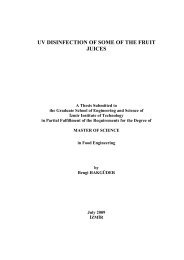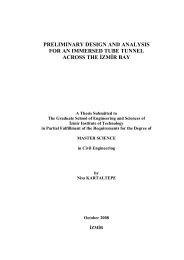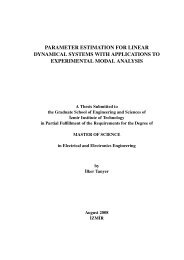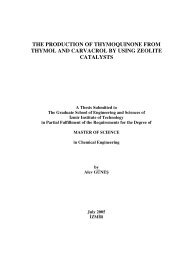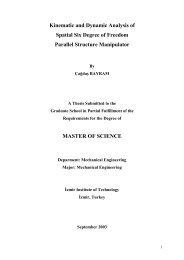a critical evaluation on the concept of justice in planning process
a critical evaluation on the concept of justice in planning process
a critical evaluation on the concept of justice in planning process
You also want an ePaper? Increase the reach of your titles
YUMPU automatically turns print PDFs into web optimized ePapers that Google loves.
I. Part-In General Pr<strong>in</strong>ciples chapter, articles about <strong>the</strong> form <strong>of</strong> <strong>the</strong> state, properties <strong>of</strong><br />
republic, <strong>in</strong>tegrity <strong>of</strong> <strong>the</strong> state, unchangeable judgements, aims and duties <strong>of</strong> <strong>the</strong> state,<br />
sovereignty, authorities <strong>of</strong> legislati<strong>on</strong>-executi<strong>on</strong>-jurisdicti<strong>on</strong>, equality before laws and<br />
c<strong>on</strong>juncti<strong>on</strong> <strong>of</strong> <strong>the</strong> C<strong>on</strong>stituti<strong>on</strong> take place.<br />
In this c<strong>on</strong>text, it is determ<strong>in</strong>ed that Republic <strong>of</strong> Turkey is “a secular, democratic<br />
social state governed by <strong>the</strong> rule that is respectful to human rights and has an<br />
understand<strong>in</strong>g to provide peace for <strong>the</strong> society and with a nati<strong>on</strong>al solidarity and a<br />
<strong>justice</strong>” (article 2). Ma<strong>in</strong> aims and duties <strong>of</strong> <strong>the</strong> state is described as “... protect<strong>in</strong>g <strong>the</strong><br />
republic and democracy, provid<strong>in</strong>g <strong>the</strong> welfare, peace and happ<strong>in</strong>ess <strong>of</strong> people and <strong>the</strong><br />
society; try<strong>in</strong>g to take <strong>of</strong>f <strong>the</strong> political ec<strong>on</strong>omic and social obstacles limit<strong>in</strong>g <strong>the</strong> basic<br />
rights and liberties <strong>of</strong> people without <strong>in</strong>compatibility with <strong>the</strong> social rule <strong>of</strong> law and<br />
<strong>justice</strong> pr<strong>in</strong>ciples and try<strong>in</strong>g to prepare <strong>the</strong> necessary c<strong>on</strong>diti<strong>on</strong>s for <strong>the</strong> development <strong>of</strong><br />
existence <strong>of</strong> people”.<br />
In <strong>the</strong> state <strong>of</strong> Turkish Republic where “sovereignty is vested fully and<br />
unc<strong>on</strong>diti<strong>on</strong>ally <strong>in</strong> <strong>the</strong> nati<strong>on</strong>” (article 6), accord<strong>in</strong>g to separati<strong>on</strong> <strong>of</strong> powers <strong>the</strong><br />
legislati<strong>on</strong> authority is given to Turkish Grand Nati<strong>on</strong>al Assembly (article 7); executive<br />
power and functi<strong>on</strong> is given to <strong>the</strong> President <strong>of</strong> <strong>the</strong> Republic and <strong>the</strong> Council <strong>of</strong><br />
M<strong>in</strong>isters (article 8); judicial power to <strong>the</strong> <strong>in</strong>dependent courts <strong>on</strong> behalf <strong>of</strong> <strong>the</strong> Turkish<br />
Nati<strong>on</strong> (article 9).<br />
In article 10 which expla<strong>in</strong>s equality before law it is told that “all <strong>in</strong>dividuals are<br />
equal, without any discrim<strong>in</strong>ati<strong>on</strong> before law, irrespective <strong>of</strong> language, race, color, sex,<br />
political op<strong>in</strong>i<strong>on</strong>, philosophical belief, religi<strong>on</strong> and seet or any such c<strong>on</strong>siderati<strong>on</strong>s”.<br />
With <strong>the</strong> last article <strong>of</strong> this part, it is decided that “<strong>the</strong> provisi<strong>on</strong>s <strong>of</strong> <strong>the</strong> C<strong>on</strong>stituti<strong>on</strong> are<br />
fundamental legal rules b<strong>in</strong>d<strong>in</strong>g up<strong>on</strong> legislative, executive and judicial organs and<br />
adm<strong>in</strong>istrative authorities and o<strong>the</strong>r <strong>in</strong>stituti<strong>on</strong>s and <strong>in</strong>dividuals and laws shall not be <strong>in</strong><br />
c<strong>on</strong>flict with <strong>the</strong> C<strong>on</strong>stituti<strong>on</strong>” (article 11).<br />
As menti<strong>on</strong>ed <strong>in</strong> article 5 which def<strong>in</strong>es <strong>the</strong> ma<strong>in</strong> aims and duties <strong>of</strong> <strong>the</strong> social<br />
state are “striv<strong>in</strong>g for <strong>the</strong> removal <strong>of</strong> political, social and ec<strong>on</strong>omic obstacles which<br />
restrict <strong>the</strong> fundamental rights and freedoms <strong>of</strong> <strong>the</strong> <strong>in</strong>dividuals and provide <strong>the</strong><br />
c<strong>on</strong>diti<strong>on</strong>s required for <strong>the</strong> development <strong>of</strong> <strong>the</strong> <strong>in</strong>dividual’s material and spiritual<br />
existence”. As can be understood from this C<strong>on</strong>stituti<strong>on</strong> def<strong>in</strong>es <strong>the</strong> state as a formati<strong>on</strong><br />
<strong>in</strong> resp<strong>on</strong>sible <strong>of</strong> <strong>in</strong>dividual-society-state relati<strong>on</strong>s and <strong>in</strong> maximizati<strong>on</strong> <strong>of</strong> <strong>the</strong> social<br />
welfare. With <strong>the</strong> emphasizes <strong>in</strong> <strong>the</strong> Preamble <strong>in</strong> <strong>the</strong> <strong>in</strong>dividual-society-state relati<strong>on</strong>s<br />
57



